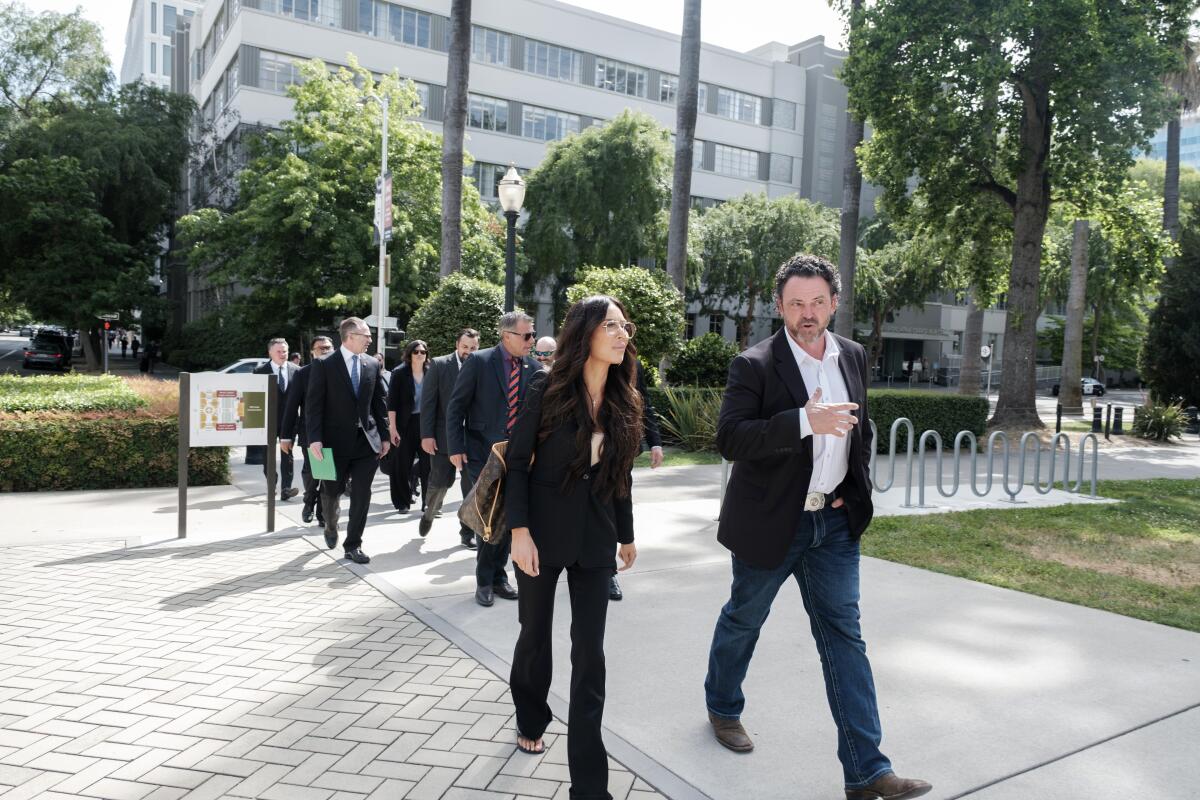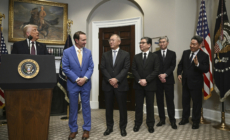-
NY Giants’ Jaxson Dart Slaps Elite Label on Shocking Player - 28 mins ago
-
Caltrans employees under investigation for wild retirement party - 44 mins ago
-
Texas Republicans Unveil Gerrymandered House Map, Trying to Please Trump - 48 mins ago
-
Tiger Woods’ Son, Charlie, Charges Hard to Top at Junior PGA Championship - about 1 hour ago
-
Why one of the biggest recorded earthquakes caused so little damage - about 1 hour ago
-
N.T.S.B. Details Evidence in Fatal Crash at Reagan National Airport - 2 hours ago
-
Donald Trump Announces Pre-Tariff Deadline Trade Pact with South Korea - 2 hours ago
-
2 months after she tried to save sister in river, woman found dead in California wilds - 2 hours ago
-
How to Watch St. Louis City SC vs Aston Villa: Live Stream Men’s Club Soccer Friendly, TV Channel - 2 hours ago
-
N.Y.C. Subway and Bus Fares Are Likely to Increase to $3 in January 2026 - 2 hours ago
California veterans urge study of ‘lifesaving’ psychedelic therapy
For years after his service in Afghanistan and Iraq, U.S. Army Special Forces veteran Joe Hudak fought a daily battle against a voice inside his head screaming anxious, dark and dangerous thoughts.
He lost multiple team members in combat during his two-decade career in the Green Berets and tried everything he could to treat his post-traumatic stress disorder — talk therapy, group therapy, medication and even swimming with dolphins.
But the voice only grew louder, leading Hudak to attempt to take his own life. He survived, but many service members do not. An average of 17.6 veterans died by suicide each day in 2022, the latest year for which data are available.
“I couldn’t be happy. I was angry and fearful all the time, white-knuckling it through life,” he said. “Then, out of the blue, a buddy from the counterterrorism unit called me up one day and was like, ‘Hey would you be interested in trying psychedelics?’”

Joe Hudak was deployed to both Iraq and Afghanistan as a Green Beret. He battled PTSD and depression after his 20-year military career.
(Joe Hudak)
A few weeks later, Hudak was en route from San Diego to Mexico to participate in a Stanford observational study using a psychedelic called ibogaine to treat post-traumatic stress disorder, anxiety and depression among Special Forces veterans.
After just one dose, Hudak experienced what he had desperately been searching for — silence.
“That voice in my head was gone. It [ibogaine] saved my life,” he said. “And I don’t mean that flippantly; I mean that, legitimately, it saved my life.”
A month after the treatment, study participants experienced on average an 88% reduction in PTSD symptoms, 87% reduction in depression symptoms and 81% reduction in anxiety symptoms.
“The before and after difference was just so striking,” said Dr. Ian Kratter, a Stanford neuropsychiatrist who co-led the study.
Hudak’s trip was sponsored by nonprofit organization Veterans Exploring Treatment Solutions, which has helped more than 1,000 veterans access psychedelic therapy abroad. Buoyed by the positive results in Mexico, the organization is spearheading legislative solutions to help make these treatments available in the U.S.
In California, VETS is currently advocating for Assembly Bill 1103, which would help fast-track the approval of academic studies on psychedelics.
Psychedelics such as ibogaine, ayahuasca, psilocybin, LSD and MDMA have all shown promising results in treating mental health conditions including PTSD, traumatic brain injury and treatment-resistant depression. But they currently have no federally approved medical uses.
“We realized that the only way to really get ahead of the veteran suicide epidemic is through research and policy change,” said Amber Capone, who co-founded VETS with husband Marcus Capone, a former Navy SEAL who also credits ibogaine with saving his life.
In 2023, Gov. Gavin Newsom vetoed a bill that would have decriminalized the possession of psychedelics, asking lawmakers to first focus on establishing regulations for their therapeutic use. Sen. Scott Wiener (D-San Francisco), responded by proposing a 2024 bill to legalize psychedelic-assisted therapy, but it died in session.
AB 1103 is more narrow in scope and would focus on changes to the Research Advisory Panel of California, which is responsible for approving any Food and Drug Administration-approved studies involving the administration of Schedule I and II drugs. This state-level regulatory burden, which does not exist outside of the California, can delay the start of studies.
Delays have real consequences, as more veterans are dying by suicide in America on a daily basis than died each day during the Vietnam or Gulf wars, said Khurshid Khoja, VETS policy director, who helped draft AB 1103.
“It is such an extraordinarily high number that if it were happening in a battlefield, there would be mass protests, but instead this is happening quietly,” he said. “If help comes in time for one veteran, to us it’s worth it.”

Veterans Exploring Treatment Solutions hosted a legislative day of action on May 14 in Sacramento in support of Assembly Bill 1103, which would eliminate unnecessary delays in researching psychedelic therapies for veterans.
(VETS)
California’s Research Advisory Panel was established in the late 1960s to vet studies on controlled substances for safety and legitimacy and help them move forward without law enforcement concerns.
In 1970, Congress passed the Controlled Substances Act, which dictated the steps researchers across the country had to take to use controlled substances in their research. California never eliminated the advisory panel and thus ended up with both a state and federal approval process.
Issues with the advisory panel became apparent last year when it did not meet for 11 months due to a tussle over a state law requiring government meetings to be held in public. A state bill that VETS supported last legislative session helped get meetings running again, but for almost a year no new research proposals involving psychedelics could move ahead in California.
AB 1103 seeks to establish a permanent solution by allowing studies on Schedule I and II drugs to be approved without having to wait for a meeting of the full advisory panel. Under the bill, researchers who can show that their FDA-approved study is already compliant with California law would be eligible to have their proposal approved by a smaller group of panel members within a matter of days.
The bill, which is sponsored by Assemblymember Christopher Ward (D-San Diego), cleared the state Assembly last month and is now awaiting approval in the state Senate.
Although there have been debates over whether the Research Advisory Panel should be nixed entirely, VETS supports reforming and keeping the panel, saying that it plays a helpful role in ensuring the safety of these pioneering studies.
Ibogaine, for example, can cause heart complications if the patient’s cardiac health is not properly assessed before administration. Psychedelics can trigger psychosis in individuals with underlying mental health conditions and, in rare occasions, can cause seizures.

VETS lobbies for a new bill to speed research on psychedelic therapies for veterans with PTSD, traumatic brain injury, and other service-related conditions.
(VETS)
Interest in the therapeutic use of psychedelics is now surging across the nation, and veterans are playing an important role in making inroads among conservative groups who have previously opposed pursuing legalization of these substances.
When one thinks of a stereotypical psychedelics supporter, an image of a tie-dye-clad hippie living on a commune in California and protesting against war may come to mind.
Army veterans are a different population. Many come from the South and Midwest, tend to lean right and often hold conservative values. This can give them a powerful voice when speaking to both sides of the aisle and helping pass bipartisan legislation.
Earlier this month, Texas passed a VETS-sponsored bill creating a $50-million state fund for drug development trials for ibogaine — the largest publicly funded psychedelic research initiative launched by any government worldwide. One of the biggest champions of the bill was Rick Perry, the former Texas governor and an Air Force veteran.
“I’ve heard the stories, studied the research, and looked these Veterans and warfighters in the eye — men who came back from ibogaine treatment in Mexico healed and finally whole,” Perry said in a statement on the bill’s passage. “Ibogaine gave them peace when nothing else could.”
Ibogaine is a psychoactive compound from the root bark of a West African shrub and has been used by Indigenous people for medical and spiritual purposes for hundreds of years. Ingesting it brings on an intense introspective psychedelic trip that researchers say can help people process trauma or emotional pain underlying their substance abuse or mental health disorders.
Another veteran who participated in the Stanford study said he experienced life-changing effects within days of undergoing ibogaine treatment.
“I had no desire to drink, no desire to chew tobacco, no suicidal ideation. I just felt whole again,” said Sean, who asked that his last name to be withheld due to employment concerns.
Sean also experienced significant improvements on memory and cognition tests after returning from Mexico.
Some researchers have reported that ibogaine may be able to help repair areas of the brain by increasing levels of molecules called trophic factors that encourage brain cells to foster new connections, said Kratter, the Stanford researcher.
“If this is the way it works, it may help the brain rewire itself in a healthier manner,” he said.
Kratter said the results of the Stanford observational study were “very encouraging” and that they demand replication in larger controlled trials.
Three years after undergoing ibogaine treatment, Sean remains sober and has an excellent relationship with himself and his family, he said.
“I became something of an evangelist for it, because it’s lifesaving,” he said. “I have six people I worked with very closely in the military that have committed suicide. If we can get this out there and save lives, it’s huge.”
Source link
















